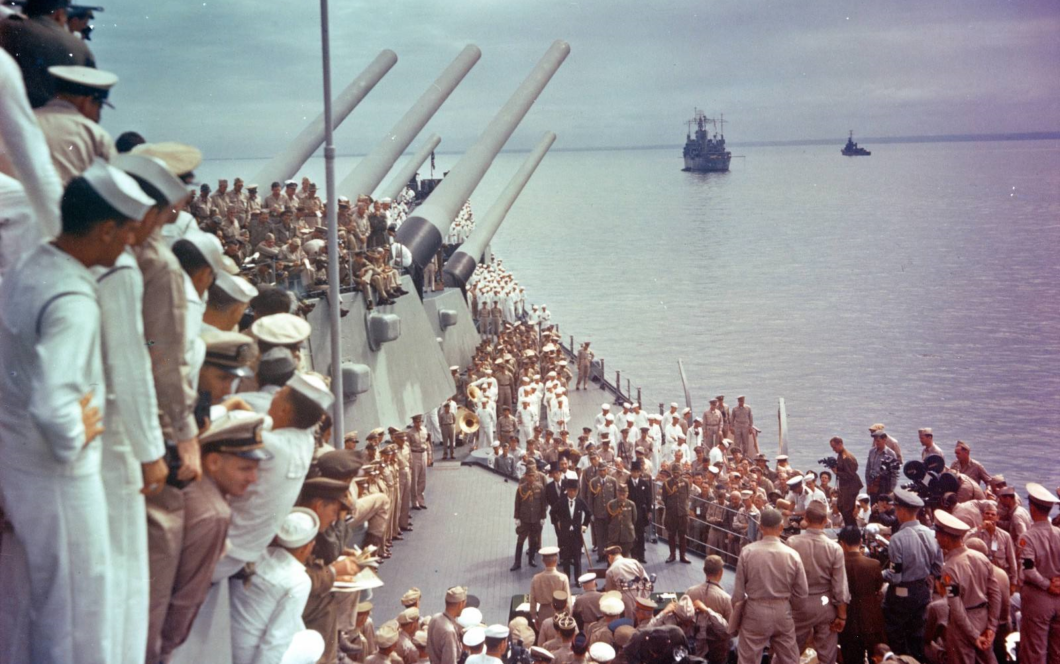World War II's Spiritual Legacies
Protestant theologian Reinhold Niebuhr called Nazism the first “great revolution” against Christendom. (Arguably the French and Bolshevik Revolutions were predecessors.) For this reason, among others, he founded the journal Christianity & Crisis in early 1941 to rally American Protestant opinion towards intervention against the Axis powers, and to reject their post WWI isolationism and pacifism, which he called a “cult of peace.”
Niebuhr, the former pacifist, saw what Paul Miller describes, which was that “World War II started when preexisting national grievances met economic catastrophe, which in turn led to ideological radicalization, the rise of nationalism and authoritarianism, and eventually international aggression.” These ideological and military aggressions were, Miller rightly notes, “all enabled by the vacuum of global leadership by liberal powers.” Miller is understandably concerned that similar conditions exist today, potentially leading to WWII’s sequel. Only “drastic action” by today’s liberal powers will avert calamity’s replication.
Miller, in his Niebuhrian plea, is not wrong. But, in the spirit of Niebuhr, maybe WWII’s spiritual background and implications should be more fully considered in any effort to avoid repeating what Churchill called “The Unnecessary War,” as no war should have been “more easy to stop.” WWII was facilitated by the refusal of Western powers to admit the reality of impending threats and their refusal of responsibility for resisting them.
That refusal was partly owing to the disastrous slaughter of WWI, widely portrayed in the 1920s and 1930s as senseless and fomented by self-serving arms merchants and financiers. There arose a widespread retrospective of moral equivalence between the Western allies and the Germanic forces. All the belligerents had been empires pursuing self-interest and blundering into war at the behest of puppeteers. That German autocracy and militarism had sought war and posed a unique threat to the parliamentary democracies became unfashionable to consider. For some British and Americans, it became chic to glamorize the Germans as superior to the French and undeserved victims. For some, this erroneous perspective exhibited Christian charity and humility towards former enemies.
American Christianity no less than British Christianity had fervently supported WWI. Even Christian pacifists often backed defiance of the Kaiser as a special cause deserving exception from their spiritual preference for peace. Many American Christians believed German militarists were the bitter fruit of 19th century theological heterodoxy, which denied scriptural Christianity in favor of a Nietzschean will to power. Germany had effectively become pagan. American Protestant elites overwhelmingly were enthusiastic for Woodrow Wilson’s orderly Presbyterian vision of a just and equitable world order arbitrated by a League of Nations.
The failure of America to join the League, and the League’s subsequent own failures, disillusioned American Protestant elites. In the early 1920s they shifted quickly into an absolutist pacifism and a delusional vision that America could arbitrate the world’s disputes without becoming a party to alliances or leagues. The Great Depression amplified these trends, especially demonizing any spending on arms or aspirations for military adventures overseas. FDR himself, as an Episcopalian, declared himself to be a pacifist, expressing the conventional preferences of Protestant elites of his day. For the 1920s and early 1930s, Niebuhr fully shared in this trajectory. As a Protestant Social Gospel liberal, he had eagerly backed WWI, revolted in horror at its costs, imagined a utopia without war, and then returned to realism in reaction to German and Japanese aggression in the later 1930s. The suffering of China, long a source of Protestant missions and spiritual concerns, especially affected Niebuhr and more than a few Protestant elites.
American isolationism and pacifism in the 1930s, fully embraced by Protestant elites, was not unpatriotic. It was rather fully synced with American Exceptionalism, imagining America as spiritually aloof from the world. America was perhaps a democratic exemplar, but it had no spiritual duty to share its political blessings with the world, which perhaps was unworthy or at least unprepared for democracy.
Western attitudes in Britain and France in the 1930s often were less robustly patriotic. British elites, including religious prelates, were increasingly skeptical of the empire and Britain’s ostensible special burdens in the world. French national self-doubts were even more profound. Its politics were more polarized than for Anglo-Americans. It had suffered more than they in WWI and was even more skeptical about its political institutions and role in the world. Its political leadership was far less influenced by religion, whose influence was limited to the political right. Parts of French Catholicism, disgusted by perceived social decadence, and terrified by Communism, became increasingly disenchanted by democracy and friendlier to rightwing authoritarianism that would infamously lead to collaboration during German occupation.
As the Western powers were increasingly uncertain about the validity of democracy in the world, and perhaps even for themselves, the Axis Powers seemed by contrast confident and dynamic. It would take the occupation of Poland, and the defeat of France, followed by the attack on Pearl Harbor, to remind the Anglo-American democracies of their duty to steward their unique political and spiritual assets. Niebuhr spoke of this special North Atlantic community of democracies and their providential responsibilities to resist the murderous anti-Christian revolution that had swept Europe, as well as the Japanese sweep through Asia.
Niebuhr of course was vindicated in his geopolitical appeal to Christian Realism, as American isolationism and pacifism became dormant after Pearl Harbor. After the war, Niebuhr and American Protestant elites would affirm America’s new global role as leader of the Western democracies. But Niebuhr, while supporting the United Nations and other international institutions, specifically warned against soaring ambitions often attached them. He saw dangers in American hubris about liberal internationalism, as Miller notes. And he saw equally urgent limits on American military or economic power’s ability to recraft the world into its own image.
If America is to sustain a world order in which democracy is safe and helps prevent calamitous military confrontation with authoritarians, it will need to leaven its fears with love and faith.
In Christianity & Crisis in 1945 Niebuhr reflected on WWII’s enormous costs and lessons for the future:
Let us therefore not seek to reduce the dimension of the history in which we are involved, so that it might be made more compatible with the limits of our powers. Let us recognize that we have faced the mystery of evil and of good, of tragedy and of victory, of divine judgment and mercy in more tremendous proportions than ever before in history. The humble consciousness of the inadequacy of our wisdom for the tasks which confront us may infuse our wisdom with grace and thus render it more adequate for the issues we must face.
Princeton Seminary President John A. Mackay warned against Western hubris amid the prostration of German and Japanese enemies. He specifically warned that Western democracy would have to be made appealing to the defeated peoples if they were permanently to renounce their political demons. Absent this appeal, future calamitous war was inevitable:
Through reasonable political and military measures another outburst of lawless demonism must be prevented. Retribution must be sternly exacted yet with mercy intermingled. For the victors should remember that, while being executors of God’s justice, they cannot themselves claim to be righteous in His sight. And woe betide any attempt at the permanent subjugation of the German and Japanese peoples! If at the close of the retribution period the economic and political arrangements still remaining in force do not commend themselves to the children of the vanquished as a fair attempt at international justice, there can be no abiding security. For no military might can cope forever with a burning sense of injustice.
Mackay quoted T. S. Eliot from Murder in the Cathedral:
Those who put their faith in worldly order
Not controlled by the order of God,
In confident ignorance, but arrest disorder
Make it fast, breed fatal disease,
Degrade what they exalt.
Mackay recalled that the victorious Western powers after WWI had succumbed to “political romanticism” and “failed to take adequate measures to guarantee international security.” He worried that this time, they would instead take “quite excessive measures” to guard their security.
Instead, the Western powers, as Miller notes, built an international security system constructed around American military and economic power, partnered with Western Europe, Japan and others. The defeated were indeed revived to become allies, contributing to victory in a nearly 45-year long Cold War, and maintain a relative global peace across much of 75 years.
Miller rightly worries that this consensus behind that USA-backed global order, which was spiritually sustained by Western Christianity and its democratic ethos, has fractured after a spectacular three quarters of a century of success. Amidst global doubts about democracy, even within the West, including America, and the assertiveness of Chinese and Russian authoritarians, Miller sees the clouds of WWIII. Although he does not reference it, America and the West are spiritually somewhat where they were in the 1930s. Religion in Europe is deflated and largely unsupportive of national purpose.
In America, religion is still more vigorous but also divided over America’s role in the world. Religionists of the right and left are increasingly skeptical of America’s global purpose. In their politics, they are tribalistic and fatalistic. There are few Niebuhrian voices pointing to duty and realism. Part of the problem is that, due to the collapse of institutional Protestantism and its intellectual life, few distinctly theological perspectives on American global statecraft are offered. Conservative Christians, bereft of others’ resources, often fall into line behind Trumpian American Greatness themes that are secular and stress USA interests to exclusion of international responsibilities. Leftist Christianity has also secularized, demonizing American influence but incongruently demanding that America sacrificially provide goods and services to the world. A Christian Realism that affirms American strength as a spiritual and moral project that must be carefully stewarded, and which inevitably will entail tragic consequences even in best case scenarios, is notably often missing.
It’s debatable whether America is more secular than in Niebuhr’s day. Church attendance in the 1930s was about where it is today, although religious institutions, and certainly Protestant elites, have far less influence today than then. Yet America is still, in its DNA, profoundly religious and mostly Protestant in its self-understanding. Recovery of national purpose and renewed international commitment will require spiritual arguments and energy.
In 1941, before Pearl Harbor, Niebuhr warned against the widespread fatalism that despaired of active resistance to the Axis powers. He noted in Christianity & Crisis:
Christian faith cannot be defeatist. It sees men’s sin and tragedies. It knows the depths of human degradation & the long road to the City of God. But it also sees men in the strength of God rising to the need & the struggle, confident, victorious in spirit.
After WWII, Niebuhr’s theologian colleague John C. Bennett, later president of Union Seminary where Niebuhr taught, similarly warned against fatalism. In Christianity & Crisis, he urged that America channel its fears about the postwar world into a more hopeful future:
The Christian lives in view of the threat of the divine judgment but he knows that this judgment is conditional, that it is not a fate before which men are helpless and he knows that the love of God is at work in surprising ways to lead men to a new possibility of good. Fear is healthy when it is in company with love and faith.
If America is to sustain a world order in which democracy is safe and helps prevent calamitous military confrontation with authoritarians, it will need to leaven its fears with love and faith. The Christian developed ethic of democracy and human rights premised on universal human dignity is the most compelling political message in the world today, or ever. But that message will need the constant collaboration of military preparedness and political sagacity by the democracies, sustained by faith, as they contend for the world’s future.



